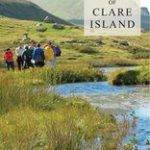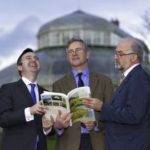Mr. Brian Hayes, TD, Minister of State with special responsibility for the Office of Public Works (OPW) today officially launched two volumes of the ‘New Survey of Clare Island’ at the National Botanic Gardens. The two volumes (Volume 7: Plants and Fungi and Volume 8: Soils and Soil Associations) are published by the Royal Irish Academy (RIA) as part of the New Survey project (Right, l to r: Minister Brian Hayes TD, Matthew Jebb, Direcotr of the Gardens and Luke Drury, President of the Royal Irish Academy)
The first survey of Clare Island in 1909-1911 was the most ambitious natural history project ever undertaken in Ireland and the first major biological survey of a specific area carried out in the world. The RIA’s ‘New Survey’ constitutes a fresh baseline study using up-to-date methodology to provide a comprehensive description of the island, from its bedrock to its biotic communities. It has revealed a century of environmental change and will provide an invaluable source for click here to visit the Royal Irish Academy publications page future environmental monitoring. The latest survey results show Clare Island is a site of international importance for some species of fungi and plants, and merits consideration as sites of Special Scientific Interest due to the presence of other rare species.
Minister Hayes said at the launch “This project is an excellent example of multidisciplinary research at its best – State institutions collaborating with researchers and independent experts to produce a survey which will provide a blueprint for other island-based research projects worldwide. I’m very proud that my office, the OPW, are associated with this very worthy project, with the former director Donal Synnott and current director of the National Botanic Gardens, Matthew Jebb contributing their expertise to the survey. I congratulate the Royal Irish Academy for their work in producing these volumes and in particular the project team members for their very important contribution to the understanding of environmental change.”


